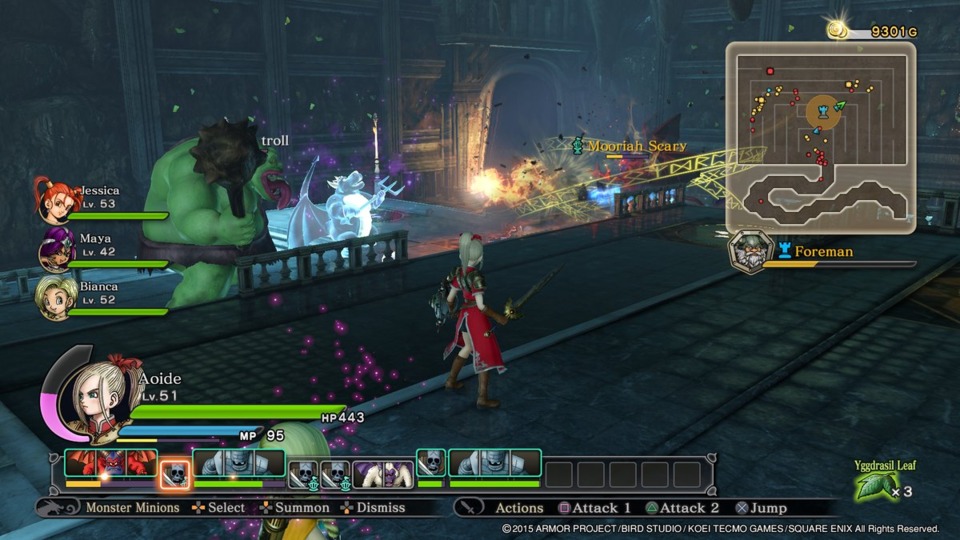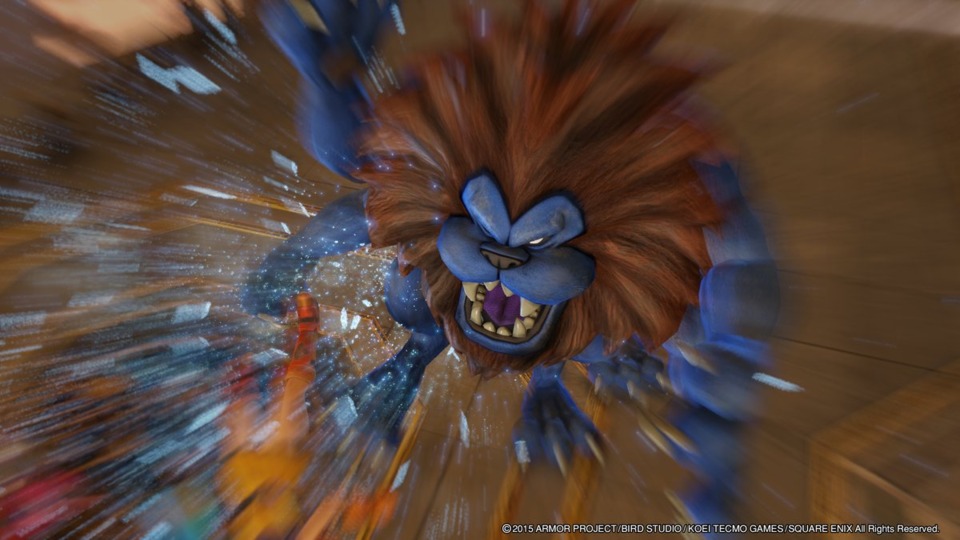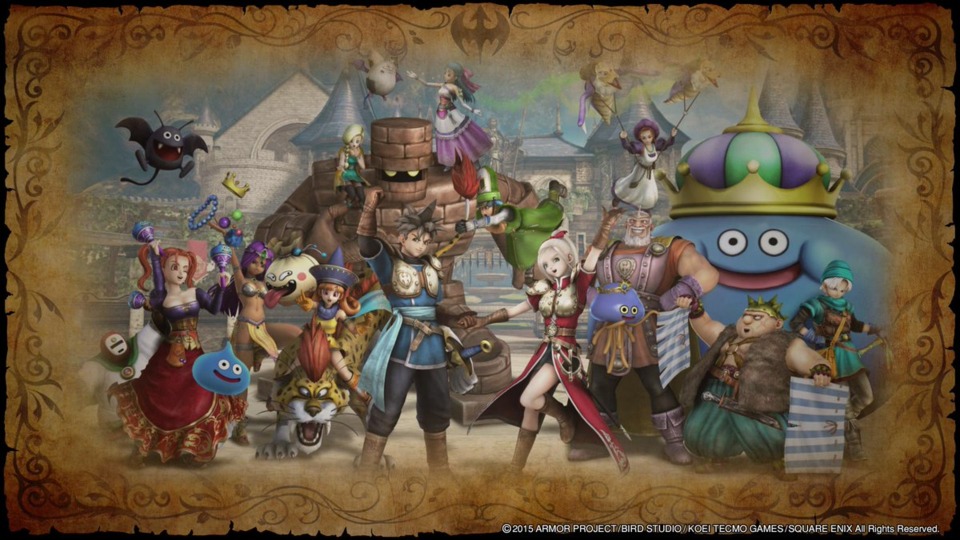Flexing the Musou: Dragon Quest Heroes and the Malleability of Omega Force's Format
By Mento 4 Comments
Intro
It is a truth, universally acknowledged, that Musou games are terrible and repetitive and time sinks and involve a lot of running between locations to protect things from thousands of nameless goons. After playing Dragon Quest Heroes for the PS4 I think I concur with all of those statements, except for the first. I'm not sure what it was about that game that finally won me over to the side of darkness, but I have some ideas.
Dragon Quest Heroes, or to give it its full loquacious title Dragon Quest Heroes: The World Tree's Woe and the Blight Below, is Omega Force's attempt to marry their Musou model to that of Yuji Horii's long-running Dragon Quest series. Dragon Quest is doubly served by its comparatively simple model here; the series's focus on no-frills turn-based combat and dopey personality has made it a perennial favorite in its native Japan and to a lesser extent abroad, where talented localizers fill them with so many atrocious puns that even I have to dash my non-existent hat to the ground and slink off in defeat, and such a model fits almost seamlessly within the Musou frame. If anything, the Musou's series emphasis on cutting through hundreds of minor mobs is preferable to what would normally be a lot more work to clear out as many weak random encounters; rather than click "attack" on a throng of slimes, you can just send a whirling vortex their way and watch them all goo flying.

The game's cycle is one that regularly balances its "maps" - action stages where one or more goals need to be met - with periods of recuperation in a hub area filled with all the amenities you might need: stores for every type of item; a desk to accept and report completed side-quests; another desk to get rewards for milestones like monster kill totals and achievements; an alchemy pot for crafting accessories; a place to exchange hard-earned mini-medals for alchemy ingredients, recipes and unique equipment; a church for saving the game and filling up healstones, one-use party curatives for when you're in trouble; and a tavern that facilitates the changing of party members. The game's emphasis on convenience doesn't end there either, as the player is allowed to retain all gold and XP earned after losing a map or getting a total party wipe, with the option to immediately start over or head back to base for more preparation. The game also eventually unlocks a means of teleporting around the playing field, provided the player has "unlocked" the waypoint destinations, and an ability called high tension - a Dragon Quest mainstay that operates similarly to limit breaks, and specifically the Trance system of Final Fantasy IX - where you turn bright pink, are entirely invincible, can cast spells without using MP and can use a powerful Coup de Grace skill that usually kills everything in sight. The game isn't exactly easy however, in a large part due to how easy it is to get swarmed - even weak monsters can be a pain with status effects and the like - and how often you're required to guard a fragile target from harm. The flow of any given map tends to follow the creation of "nightmaws": ominous portals from which enemies ceaselessly pour out until a nearby "mawkeeper" enemy is slain. This forces the player to balance offense and defense, as they cannot hope to weather a huge influx of enemies bearing down on their location without thinning their numbers at their source(s), but nor can they afford to leave the target alone for too long. The game counters this again with a system that allows the player to recruit monsters, some of which appear for a single special attack though most will stick around and guard the area near where they were summoned.
Why Dragon Quest Heroes Works
I think the true strength of DQH is how both franchises complement each other, rather than sit awkwardly side by side. The Musou format loses a bit having to conform to a typically Dragon Quest narrative - every map is sequential, barring a handful of bonus areas, side-quests and some post-game challenges, and the gameplay is frequently interrupted with cutscenes and exposition as new characters appear and story-critical lore is explicated. You're railroaded from one location to the next, as per Dragon Quest's usual linearity, and map goals rarely stray from the "defend a location from endless spawns" template. Sometimes your protected target moves around, sometimes there's several targets, and occasionally - mercifully - you simply have to sweep the map of enemies and there's no guarding to be done whatsoever. There are no enemy generals to fight, only larger monsters who present a bigger threat, and the game instead has the fairly un-Musou convention of event-style boss fights at the end of each of its major areas.
The boss fights are where the game shines, I feel, and not just because very few ask you to guard something: each boss is built in such a way to offer a different type of challenge, the variation of which allows for some of the game's ingenuity to emerge. A fight against a Gigantes - the enormous cycloptic horror you can see on the box art - requires the use of turrets to reach its central eye, which doubles as its only effective weakpoint. A tag team battle against a slow-moving Troll and a faster Cosmic Chimaera is complicated by the fact that the weaker Chimaera will spend half its time flying around and shielding itself though will, on occasion, fly over and heal the Troll. Even the first boss fight of the game, against a standard dragon, requires that the player focus their attacks on its head even though that's where all the teeth and fire are at, presenting a defensive quandary where you're at the most risk in a position where you're doing the most damage. Even Souls games struggle to create boss encounters with that degree of calculation.
But even when you're knee-deep in the routine of cutting through swathes of incoming enemies, the game has a striking moment-to-moment excitement to it. I feel the effect is less pronounced in regular Dynasty Warriors because of how absurd it is that a guy dressed flamboyantly in blue feathers is tossing around regular soldiers like they were Autumn leaves, but the disparity between the player character's martial and magical ability and the many weak fodder monsters in their path is a better fit in a traditional JRPG universe like Dragon Quest. Near every character has at least one ability that does a moderate amount of damage to a wide area of effect, designed to clear out the riff-raff to create more space to take on the more formidable foes. The sheer pace of the game is refreshing enough, but exponentially so when you compare it to standard Dragon Quest, and even if you grow tired of sending out freezing tornadoes or bolts of lightning, you can switch to another character and find a whole new suite of options. Each character has four special attacks as well as various combos of normal and heavy attacks, and it's through experimentation that you discover who works best in which roles. For instance, the heavy-hitter King Doric is an unexpectedly good support character because of his "Vimstone" talent that increases the speed at which tension builds for the whole party, and Yangus makes the perfect tank due to two abilities that attracts enemies and makes himself temporarily invincible, respectively. The effort to make every character a feasible contender is even reflected in clever little touches such as how Isla, the stylish inventor that built the various turrets you can use on certain maps, will do considerably more damage with those turrets as a result of her expertise.

Ultimately, however, what Dragon Quest Heroes impressed on me is just how flexible a framework "Musou" actually is. I recall watching the recent Quick Look on the Attack on Titan Musou game, and how it was both simultaneously unmistakable as a Musou game - the slow-mo motion blur effects for kills appears to be a recurring stylistic feature for Omega Force - but also a far different beast than the many other Musou games I'd seen, to the extent that Jeff was even enjoying (kinda) its bizarre giant naked dude visuals and aerial balletics. Musou can be adapted to fit many different licenses if the developers care enough to figure out the distinguishing characteristics of those franchises and how to capitalize on that by modifying the engine and format they have already. I don't see how they could ever fix the universal issue of being repetitive slogs, but at least the variation between games, and in how they handle characters, how combat tends to unfurl, etc. counts for something. Perhaps to Musou purists games like Attack on Titan or Dragon Quest Heroes seem too gimmicky and too superficially beholden to the license holders to allow for any significant story risks, but I can see the range that is possible in what I previously perceived as a rigid and flawed framework that wouldn't ever be "right for me". I look forward to seeing what they do with the upcoming Berserk; while Guts can cut a bloody swathe through legions of faceless soldiers like the best of them, it's how the game handles fights with the demonic Apostles that I'm the most curious about.
Further Reading
Despite the misleading title I'm not actually a stranger to Musou games, or even Dragon Quest spin-offs. The first Musou game I genuinely enjoyed - to the extent that I played it for over 50 hours and beat the "story", or what little it had - was Bladestorm: The Hundred Years' War for the Xbox 360. That game puts the player in the greaves of a 14th century fledgling mercenary who somehow manages to participate in every major event of the titular century-long territory fracas between England and France, and usually on the side of whoever won that particular battle due to the flexible loyalty of a merc. Thus, you can join the English longbowmen for a decisive victory at Agincourt while following it up by charging into battle with a banner of French chevaliers alongside Joan of Arc and her confidantes La Hire and Gilles de Rais.
I'd tried Dynasty Warriors before and since then, of course, but the completionist side of me always balked at how the game would task you with completing the same scenarios with a hundred different characters. The way Bladestorm was set up meant you only had to worry about the development of one character - your protagonist - and compromised for its lack of character diversity by introducing various troop types you could master. This helped keep the game focused and palatable, as I could drop out and join different units to keep battles interesting and adjust my position on the battlefield as the prevailing strategy would mandate. About to reach a base? Join some shock troops like spearmen to rout the sword and shield infantry guarding it. In the middle of a field filled with soldiers? Grab some cavalry and charge through the enemy ranks like tissue paper. Likewise with regards to this "conservation of character development" - though Dragon Quest Heroes has multiple characters to choose from, each with their own array of abilities and individual skill trees, they fall into a natural JRPG party format. You take three characters into a sortie with your protagonist, who is compulsory, and can switch between them whenever you wish. All see an equal share of the experience, though the ones left behind only receive a fraction.
As for spin-offs, I may have actually played more Dragon Quest gaiden games then I have core ones. Of the core Dragon Quest series, in which there are presently ten games, I've only seen the end of the fourth and the eighth. I played the ninth for a long while, but the sheer size of the game caused me to eventually drop out; I've never believed the portable format to be ideal for long RPGs. Elsewhere, I've played and completed the wonderful Dragon Quest Heroes: Rocket Slime, slashed my way through the curious Dragon Quest Swords: The Masked Queen and the Tower of Mirrors, got a few dozen hours into the first Dragon Quest Monsters (whose protagonist Terry is also in Dragon Quest Heroes, though I understand that the character originally came from Dragon Quest VI) and dabbled with the Super Famicom game Torneko no Daibouken, which starred my favorite character from Dragon Quest IV and was the inaugural Mystery Dungeon game (another "time sink" series I'm only vaguely familiar with). Due to Dragon Quest Heroes being heavy on the cameo side - the player can choose to use the four new characters, or switch it up with some old favorites - I was happy to see at least six legacy characters appear in Dragon Quest Heroes that I was already acquainted with, and spending time with the others gave me more reason to seek out the games they pertain to as well. I especially want to throw down with Bianca in Dragon Quest V now, given how powerful she is in this game (and her adorable West Country accent). I'm also very curious about the upcoming Dragon Quest Builders as I'm sure are many of you, and I'm secretly hoping Square-Enix pulls their finger out and localizes Theatrhythm Dragon Quest soon as I loved the advances made with Curtain Call and Koichi Sugiyama's tracks have always been on the right side of earwormy (it figures the guy was best known for his commercial jingles before creating Dragon Quest's famous theme). Oh, yeah, and I guess there's a second Dragon Quest Heroes floating around too. It's been a busy year for all the slimes and platypunks out there.

So while I have some experience individually in the two worlds that have collided to produce Dragon Quest Heroes, I'm not particularly devoted to either. In general I appreciate Dragon Quest more than I actually like it, and I've regularly been perplexed by Musou games and the approbations they seem to garner. I think it was the combination of a low price, some mild affection for the license and our own @unastrike's recommendation that finally pushed me over the line. In the end, I'm glad I took a chance on the game. Now I'm eyeing Hyrule Warriors on Amazon and wondering how my life went astray...
